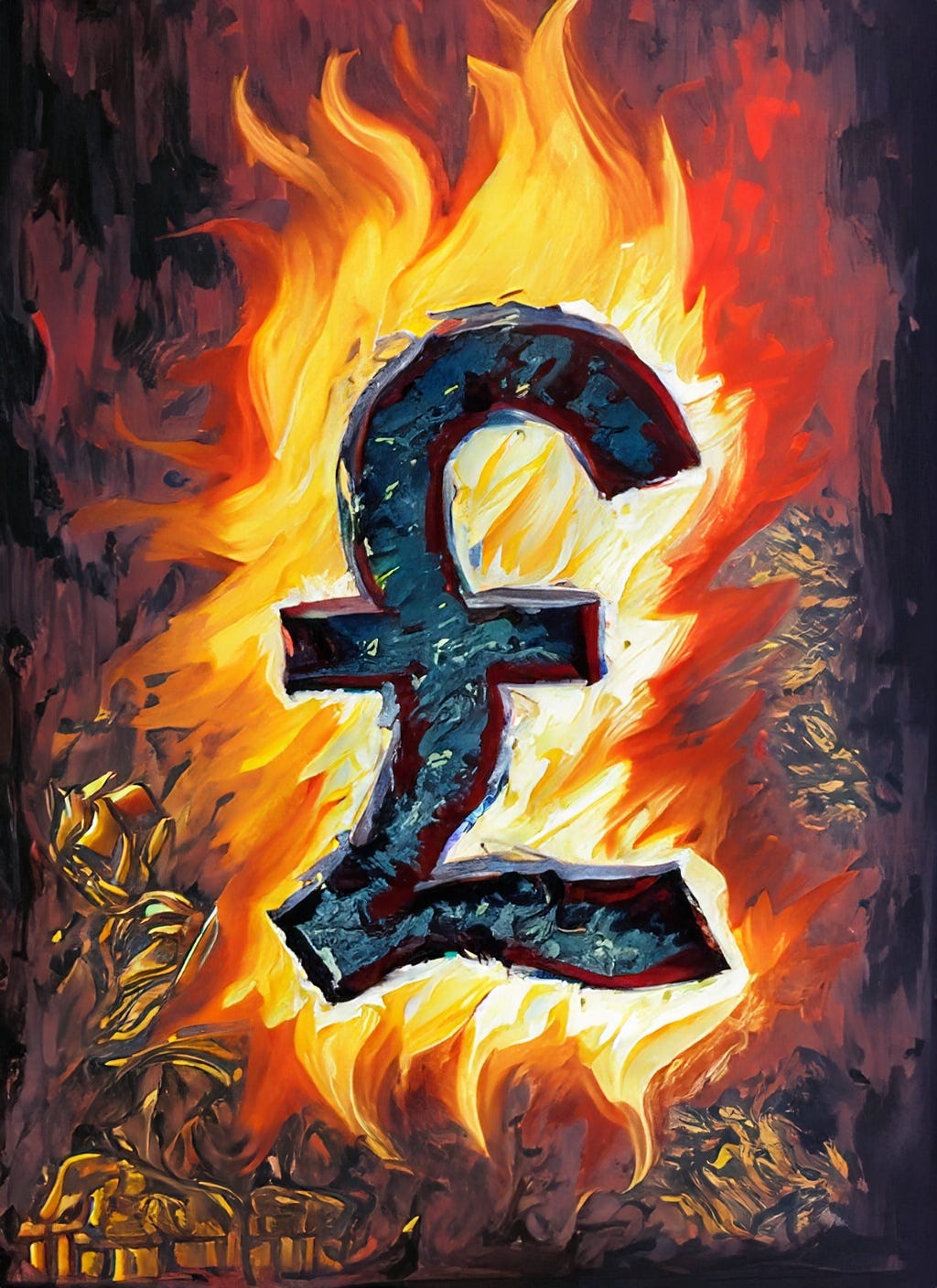BBC News Lies #6: We're drowning in debt.
The catastrophic decline of our currency valuation is being sold as "potentially an issue".
When it comes to articles about money and the economy, the BBC is often guilty of one crime; conflating socialist theories about the economy with actual economics. “Socialist economics” means the plethora of ideologies about how an economy “could” be. These centre on the idea that economic prosperity is driven forward primarily by the government taxing you and your businesses, and then spending it on government projects. The economic reality is that taxes take away from the free and open market where wealth is created; it takes away from your earnings, your investments, your savings, and your future.
In the free and open market, billions of decisions are being made every millisecond. From someone trading a stock, to someone choosing one supermarket over another, to choosing one mobile provider over another, from whether you walk or take the bus, all of these decisions work together to drive the economy. It’s often referred to as “the invisible hand”, a concept first written about by a Scotsman and Founding Father of the United States, Adam Smith. When people make their own judgements about prices and their personal requirements in any one year, day, hour, it influences the economy to move towards those wants and needs. The results of a free market are a reflection of our society. It’s the most efficient allocation of resources available. It’s a beautiful and almost miraculous fact of life that when people are left to be free to choose, the market moves positively in the direction that people want it to. We prosper in freedom, and find abundance in liberty.
Socialist economic theories, on the other hand, argue that the government spends money at least to some degree better than the public does. They would say that centralised decisions run by experts, politicians, and bureaucrats create economic output in the direction that people want it to. It can’t be expressed how backwards and utterly disproved this idea is in the history of all the world’s economies. Every government that dared enter the realm of centralised financial decisions, such as deciding prices, availability, innovation, resource allocation, and direction of growth, has failed so spectacularly that they literally had no choice but to take steps to liberalise the economy. Venezuela, Turkey, the Soviet Union, and communist China all briefly experimented with centralising economic and financial decisions to enormously disastrous results, some more than others. North Korea is likely the only remaining totally centralised economy in the world.
In this article, we will be exposed to both of these concepts often in the form of quotes like “some economists argue X, some argue Y”. In these concepts, remember that the economists advocating for more government debt, more government spending, and more tax, are from those socialist schools of thought when it comes to economics. The second recurring sin often found in BBC News articles about the economy is the perpetual effort to educate yet confuse the reader into not really understanding inflation, money printing, overspending, and debt. I will pick these apart in plain English, and try to clear up some of the vague language so we can understand the depth of the lies we’re being told.
Article: How much money is the UK government borrowing, and does it matter? - Unnamed BBC News journo
The government is spending more on public services than it raises in tax.
To bridge this gap it borrows money, but this has to be paid back - with interest - and that can influence wider tax and spending plans.
Between 2003 and 2022, the government spent over £100bn more than they earned in tax revenue, every year. Some of those years the government spent close to £200bn more than tax revenue. Over the first year of Covid, that overspend was nearly £400bn. The most recent full year was an improvement; 2022-2023 overspend was a “mere” £33bn. For those years 2003-2022, overspend alone totalled nearly £3tn. That’s a 3 followed by 12 zeros. It seems the government can’t be trusted with a credit card.
The fact that this annual overspend isn’t a scandal, is in itself a scandal. The government should be apologising for every pound they overspend. Why? Because raising money to cover for this deficit can be done either by taking more of our pounds in higher taxes, or by eradicating the value of those few pounds we have remaining (known as “inflation”). Both of these are inexcusable and catastrophic failures of government. In a country with such an abundance of wealth, hard work, and prosperity, with taxes as high as they are, it’s not morally right to be overspending to this degree. Having already written an article covering half a trillion pounds of waste on failed government projects, it shouldn’t be such a controversial statement to say the government must control spending, and keep it within their annual income.
The government gets most of its income from taxes. For example, workers pay income tax, everyone pays VAT on certain goods and companies pay tax on their profits.
It could, in theory, cover all of its spending from taxes, and in some years that happens.
But if it can't, it will cover the gap by raising taxes, cutting spending or borrowing.
In no year in the last 20 years has the government managed to cover its spending with its tax income. In fact, in the last 50 years, the government kept within its limit a mere 5 times. It’s a little disingenuous to tell the BBC News audience that “sometimes there’s a surplus” when really the few surpluses were a complete anomaly. The last time we had a surplus was in 2001, where there was £22bn remaining in the tax accounts after all government spending. It’s small compared to the ongoing deficits, but even a small surplus represents something huge; we can keep to budget, and we can save for a rainy day. When you overspend, you need to borrow money to cover the difference, and when you borrow, you’re borrowing essentially from the future to cover the now. This means that in that future, you will have less money for government spending then too. Compounding the problem are interest payments. Interest payments are a real and long lasting cut into all future spending. Since 1990, interest alone accounts for 5.5% of government spending. That’s one in twenty of every pound spent by the government every year, just on interest. Total debt adds up every year too; it currently sits at exactly 100% of our GDP: £2.5tn. We’re kicking a can down the road and the can gets bigger and bigger every time we do, and one day it will become an obstacle.
Higher taxes mean people have less money to spend, so businesses make less profit, which can be bad for jobs and wages. Lower profits also mean companies pay less tax.
So, governments often borrow to boost the economy. They also borrow to pay for big projects - such as new railways and roads - which they hope will help the economy.
Government does not create wealth, it destroys it. People, and the businesses and trades they engage in, are wealth creation machines. The BBC News article here engages in what can accurately be described as socialist economics. This is a bizarre ideology that says that the government can drive growth by removing profitability and resources from the private market and spending it on public works. It’s a belief rife in government communications simply because it is an easy lie to tell that isn’t easily understood by the public.
Higher taxes are devastating for an economy. It punishes people in a way that cannot be seen. You can’t see the missing small to medium businesses, you can’t see the missing economic growth, you can’t see the missing employment opportunities, you can’t see the missing higher wages. You certainly can’t see the missing abundance and prosperity that comes when people have more control of their own money, choosing freely where and how to spend and invest it. Where this article says higher taxes “can be bad for jobs and wages”, what they mean to say is it is devastating to the employment market, as well as to small to medium businesses. As well as destroying opportunities for small businesses, it leads to economic centralisation around a smaller and smaller group of big businesses. For example, people always have to buy food, so Tesco will always have customers. If businesses are less profitable and customers are squeezed for money, they’re going to spend less on local produce, small business catering, independent cafes, and the likes, and a lot more at Tesco. It destroys not just social mobility, but it erases culture as well, as it is the small, local, quirky and traditional businesses, run by enterprising local people, that give charm and delight to an area. When higher taxes results in less spending power, these are the first businesses to lose out. It’s not a surprise that many towns and cities in Britain have lost their cultural charm and differences, and have become far more municipal and utilitarian in nature.
The government borrows money by selling financial products called bonds.
A bond is a promise to pay money in the future. Most require the borrower to make regular interest payments over the bond's lifetime.
UK government bonds - known as "gilts" - are normally considered very safe, with little risk the money will not be repaid.
When you buy a gilt, you’re lending money to the government on the promise you will be paid back. The Bank of England is a major buyer of gilts with around £900bn in gilt assets. The trick here is that the BoE often prints the money used to buy the gilts, creating money out of thin air. This causes inflation; put simply, there are more “pounds” in the economy, but the same amount of demand and resources. It devalues the currency and results in higher prices paid by businesses, which are then often passed onto the consumer. This is a form of tax, because the value of your money is being decreased through inflation. An analogy would be; if you were paid in gold coins, inflation is the taxman shaving a few cuts of gold off of every one of your coins. You still have the same amount of gold coins, but they’re worth less than they were before, and the taxman is now in possession of that “shaved-off” value. These inflationary financial products are the result of the government being unable to spend within its colossal budget. It proves we should never trust the government with the power to overspend on tax revenue.
The Bank of England has also bought hundreds of billions of pounds' worth of government bonds in the past to support the economy, through a process called "quantitative easing".
To cover up blatant money printing, a new doublespeak word was invented during the 2008 financial crisis, “Quantitative Easing”. QE is the same as printing money, but with extra steps. Instead of a Central Bank simply just printing more money and spending it, the extra step here is that a “non-governmental” central bank (the Bank of England) prints a load of money and then uses it to buy these gilts. This does not support the economy, it harms it in order to aid government overspending. New money is created, existing money gets devalued, the government wastes the money, and needs far more next year because the money has been devalued. It is a cruel economic cycle that has quickly begun to spiral out of control. Gilts so far have been considered a safe investment as the UK government has yet to miss a debt payment on gilts; it’s safe until it’s unsafe, and it’ll only need to happen once before nearly a trillion pounds in gilts could be at risk. At some point, this debt needs to be paid, by cash or by crash.
The total amount the government owes is called the national debt. It is currently about £2.6 trillion.
That is roughly the same as the value of all the goods and services produced in the UK in a year, known as the gross domestic product, or GDP.
Every year, we borrow money from next year. It’s not hard to figure out that this is not sustainable. At this point, it would take every pound from the entire nation’s output over a year to bring our debt down. You could overtax and bankrupt every billionaire, every millionaire, every mega corporation in Britain, and you wouldn’t come close to paying off this debt. It’s massive, and the spending has been out of control for a long time. Although spikes here and there can be blamed on the governments botched reaction to the 2008 financial crisis or the equally botched 2020s Covid spending, it’s clear that this has been a “line go up” situation for many decades. It’s good to see something clear, concise, and correct from this article. It makes for clear reading, amongst a sea of confusing economics.
But in relation to the size of the economy, UK debt figures are still low compared with much of the last century, and also compared with some other leading economies.
Then we go right back to doublespeak; when the uncredited BBC journo says national debt is low compared to “much of the last century”, they’re referring to World War 2. It was a time when the entirety of the United Kingdom and every resident in it worked like their life depended on it, because it did, and spent every possible pound and shilling on weapons. It’s disingenuous to even imply that todays insane 100% debt-to-GDP ratio isn’t necessarily unusual, especially when they’re not adding the aforementioned context.
The second half of this doublespeak is also an ugly semi-admission of international Western failure; yes, unfortunately, a great deal of leading economies have also dug an equally gigantic debt hole for themselves. The article is referring to countries like Japan, Italy, the United States, to name a few; it doesn’t mention that this is a situation also shared by Sudan, Libya, and Venezuela. This is not a good thing.
The larger the national debt gets, the more interest the government has to pay.
That extra cost was not as big when the interest rates due were low through the 2010s, but it is more noticeable now that interest rates have been rising.
If the government has to set aside more cash for paying its debts, it may mean it has less to spend on the public services which it borrowed to fund in the first place.
Claiming that the interest payments are now “more noticeable” than before is a ridiculous way to put it; they mean “utterly out of control”. June and December 2022 saw the largest interest payments in British history; £20bn and £18bn respectively. Those represent interest payments in a single month. Most months interest payments are nearly double that of the pre-printing pandemic. Yes, if the government has to spend more money paying back its debts, it will not have the money to spend in future. Again, the level of catastrophe cannot be understated, unless it’s in a BBC News article.
Some economists fear the government is borrowing too much, at too great a cost.
Others argue extra borrowing helps the economy grow faster - generating more tax revenue in the long run.
There is only so much you can take from the future; every year for years we’ve borrowed hundreds of billions from our shared future. The interest payments are currently eating our government alive. The debt has skyrocketed, and has begun to get out of control. This is all because the government couldn’t control its spending to within the colossal budget it was already afforded through taxation. This is exactly the results of socialist economics; runaway spending, all hoping for a better tomorrow, as opposed to letting the free market make their own decisions with their own money. Is it any surprise that our economy is sitting in the same toilet as the likes of Sudan and Venezuela when it comes to debt?
We’re all aware that the government wastes vast sums of our money. There are programs such as paying people not to work that cost far more than the deficit between tax revenue and spending. We know that the NHS overspends on all pills and drugs, as well as consultants that costs thousands a day. We’re aware that the government bureaucracy employs entire departments focused on bizarre racial and sexual theologies. We are all well aware of the colossal spending that goes on in housing illegal immigrants into the country. We knew that spending £100bn on shaving 40 minutes off of a train journey was not good spending. It’s not a far fetched theory to say that there are more than a few major government projects and schemes that need to evaporate overnight, and if they did, would solve our deficit overnight.
Chancellor Jeremy Hunt has previously said the government will take "difficult but responsible" decisions on the public finances.
He previously blamed the "twin global emergencies of a pandemic and Putin's war in Ukraine" for driving up government costs.
No one has faith in the Tory government to do anything effective. They’re as far left as Labour used to be. Even Labour have reigned in the racial theologists, communists, and ideological supremacists that plagued their party making them unelectable despite consecutive Tory failure governments. Blaming some big event is a typical political statement to blow off responsibility from their own shoulders. The truth is, the UK government has been overspending to extreme levels for decades and decades, and if we’d had some surplus in a national investment fund, none of these global emergencies would have done as much damage to the economy as they did. It’s like blaming someone else for getting a scratch on your car after you’ve spent ten years scratching and denting it from bumper to bumper. However, the government will not accept responsibility, it will shirk all blame onto relatively unrelated issues, and the politicians in charge will never feel the pain they’ve wrought upon the economy.






